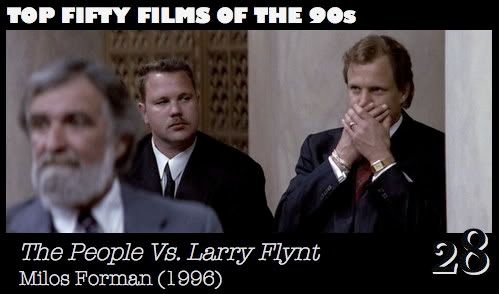Top Fifty Films of the 90s -- Number Twenty-Eight

#28 -- The People vs. Larry Flynt (Milos Forman, 1996)
Much as I enjoy all the boisterous, bawdy business in Milos Forman's The People vs. Larry Flynt, my favorite scene is arguably the most straightforward and sedate. After years of defending the notorious publisher of pornography in legal skirmishes great and small, lawyer Alan Isaacman steps in front of the highest court in the land and argues for the validity, even urgency, of Larry Flynt's First Amendment rights in a case that's been brought against him by the famed television minister Jerry Falwell. As is usually the case at the Supreme Court, the lawyer's opening statement is quickly interrupted and the justices begin peppering him with questions about the case. Screenwriters Scott Alexander and Larry Karaszewski pull what follows directly from the court transcripts, and the result is an inspired civics lesson, a simple portrayal of how heated issues get turned into measured debates and decisions that have widely reverberating ramifications for a nation are made. Part of its strength is derived from Edward Norton's smart, crafty acting in the scene, believably making it seem as if he's coming up his answers spontaneously. More crucial to the success of the scene, Norton makes it apparent that he's not just answering, but he's considering precisely which answer will be most beneficial, measuring his response before he offers it. There are no cheap filmmaking tricks, no amped up music score or florid pontificating. There's just informed, intelligent people discussing the very fundamentals of American freedom, and that's what makes it gripping.
Of course the scene also works because of everything that comes before it. The film is a biopic, but a wholly unconventional one. While it indulges in some of the conventions of the genre--celebrating the way its subject overcomes personal hardship, generating feelings of inspiration in the way he bucks the odds to achieve his goals--it provides a protagonist who also defies sympathy every step of the way. Even putting aside that his fame and fortune are the result of particularly raunchy and off-putting pornographic magazines, Flynt is contentious, bullheaded, brutish and often operating in manner that undercuts the efforts of those who are putting themselves on the line in his service. Woody Harrelson plays Flynt in a performance that is revelatory, particularly coming just three years after he'd finished his run as the sweet, simple bartender on Cheers when his most notable prior film roles involved teaming up with Wesley Snipes in off-kilter buddy films. Harrelson is notably and admirably free of vanity in his performance, playing the ugliest parts of Flynt's character with the same vigor he brings to the snatches of almost accidental bravery.
Forman's approach as a filmmaker is nearly as rascally as that of his subject. He assembles the procession of unlikely material with great zest, making a film that is brightly, briskly entertaining. Whether Flynt is scheming to supplant Playboy's place at the top of the porn rag food chain by wallowing in the sleaze of it all or deflating the pious souls who rail against him, sometimes even as Flynt himself is embracing the Gospell, Forman leans more towards flinty comedy than history lesson. That glee makes the film's most serious points--especially the notion that freedom only has value when it's extended to those who use it for purposes that may be questionable, even reprehensible, a belief that's easy to voice, more difficult to live with--all the more meaningful.